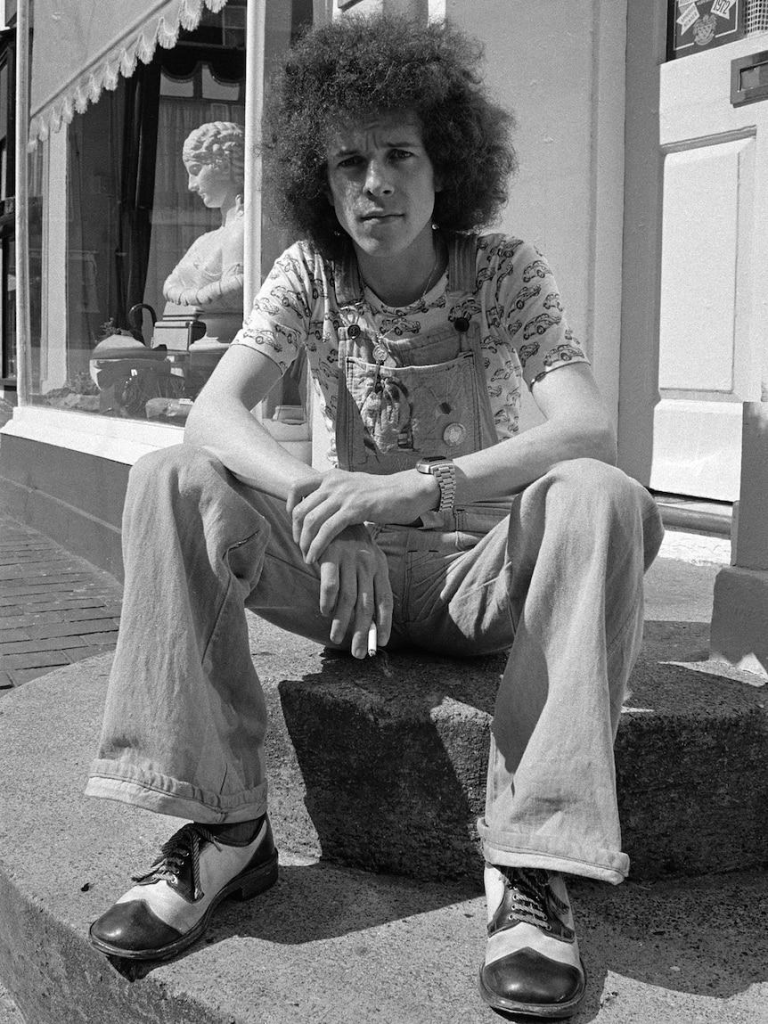“I look at my role as being a friend of Canberra Hospital, I can bring some pleasure and happiness sometimes to people who are really in difficult times in their lives.”
With backing music from a Bluetooth speaker, Sayer croons his way around the cancer wards, making a human connection with everyone he comes across.

Canberra Region Cancer Centre Operations Manager Caroline McIntyre says Sayer’s visits are typically kept a surprise for patients and staff.
“He’s always come in so discreetly,” she says.
“Normally it’s just very quiet, he comes up in the back lift and says hello to literally everybody.
“Some of them are doing it tough, and to have a little bit of joy and light – it really gives them a lift.
“What makes me happy is to see people getting chemo on their feet dancing.”
Jamming with Jimi Hendrix, Countdown and the Troubadour
Originally a graphic designer by trade, English-born Leo Sayer rose to pop prominence in London in the late 1960s, as a singer-songwriter – and was soon adopted by Australia as an honorary son after his first tour here in 1974.
He went on to become an Australian citizen in 2009.
Sayer was a regular on ABC TV’s Countdown during the 70s and 80s, performing chart-toppers like “You Make Me Feel Like Dancing”, “When I Need You”, “More Than I Could Say” and “Orchard Road”.

He blushingly admits they were wild days – when he didn’t always live up to his “good-guy” public persona.
“It was mad, I mean, Top of the Pops in England, Countdown over here,” he says.
“You were mobbed by the fans, I remember being dragged out of a limousine the first tour that I came here, and then speaking to crazy people like Molly Meldrum on TV and trying to sort of like take it all in.”
It seems hard to believe – the petite, well-spoken singer, with a mane of curly hair that inspired changing his name from Gerard to Leo – beating off mobs of screaming fangirls.
Sayer circulated in superstar company, becoming close friends with former Beatles George Harrison and Paul McCartney, collaborating with Roger Daltrey of The Who, and even sharing a sly cigarette or two with John Lennon and Yoko Ono who had a flat above his design studio.
“I met Jimi Hendrix right at the start of his career. I actually jammed with him, playing the harmonica, and him playing the guitar,” he says.
Recalling his 1975 opening night at the famous Troubadour Club in Los Angeles, he looked up to see an intimidating line-up of fans in the front row.

“It was David Bowie, Elton John, and ‘The Fonz’ [Henry Winkler].”
Alongside them: John Cleese, Mick Jagger, Bernie Taupin, and comedian Marty Feldman.
“We never thought it would last, we were adapting to things around us, writing songs about things that are around us,” he says.
“And we thought they were only for our generation — so the amazing thing is my music’s become like a fine wine, where you lay it down and years later, it becomes a collector’s item.
“We’re in an age where the music that I make, young kids are actually latching onto it now, and they’re finding that that generation and that style of music we made is as current now as anything.”
Sayer’s health battles, still spreading hope at 76
Leo Sayer says his hospital charity work caps off a career dedicated to providing joy through music.
“It’s a nice piece of synchronicity really, because I was born in the grounds of a hospital in Shoreham by Sea in Sussex, near Brighton in England,” Mr Sayer said.
“I suppose I’ve always felt comfortable in hospitals and being around hospitals.
“Growing up, my dad was a hospital engineer, Mum was a nurse, my sister was a matron.”

Sayer has health struggles of his own, including three stents in his heart, which help him have a genuine connection to the hospital patients he entertains.
“[My music] is providing something that isn’t taking away from any of the treatment that’s going on. It’s providing something that’s just putting a smile on peoples’ faces.
“Music is communication and that’s what this is all about, we’re communicating, we’re making people feel better.
“We’re not healing people with music, but we are making them feel better about their healing.
“To sell out Canberra Hospital will do me fine.”
Lassie’s little Timmy reveals the secrets of TV’s most famous dog
For nearly two decades most of us can remember tuning in to see the latest adventures of the most famous dog on TV – Lassie.
This much-loved Rough Collie dog and her human companions graced our screens for 17 seasons from 1954 to 1973 and even made the transition from black and white to color in the ’60s.
But who could forget the adorable little boy who joined the show in its fourth season when he and his family adopted Lassie – 7-year-old Timmy Martin.

Now Jon Provost, who played Timmy, has celebrated his 74th birthday and shares the joy he had filming with his four-legged friend and how he was discovered by Hollywood at just 3 years old.
The Los Angeles-born actor said when he was 3 years old he was taken to an audition for a Jane Wyman movie because his mom was a huge fan and hoped to get her autograph. But, out of the 200 kids auditioning for the part, Jon got it.
It was far from evident that Jon would become an actor. His father worked with something completely different – he was an aeronautical engineer.
”My parents weren’t Hollywood people. My father is from Alabama and my mother is from Texas,” Jon said.

At age 4, he landed a role in a Grace Kelly and Bing Crosby movie.
“I didn’t have an agent. I got one and that led to more movies like The Country Girl with Bing Crosby and Grace Kelly. I did about 12 movies before I started ‘Lassie’”, he told Fox News.
Three different Lassies
Recalling the bonds he formed with the three different male dogs that played the part of the female Lassie, Jon said he developed the biggest bond with the last dog to play Lassie.

“I did the show for seven years, 249 half-hour episodes. I worked with three different Lassies. The last dog I worked with, I worked with him for five years alone,” he told Fox News.
“We grew up together. For five years, we saw each other five days a week and sometimes on weekends.
Revealing how well behaved the dog was he added: “The actors made more mistakes than the dog. They were more of a problem,” he laughed.

After leaving the show at 14 years old he starred alongside the likes of Natalie Wood and Kurt Russell and never fell into the Hollywood child actor trap saying: “My parents let me pretty much do what I wanted to do. I didn’t have to take a job.
“When I left Hollywood, I thought it was good that I did.”

Today Jon lives out of the limelight in Northern California but still gets fan mail from his time in “Lassie”. In 1994, the actor received a star on the Hollywood Walk of Fame.
Meanwhile, Lassie, the canine character, became so popular that she even had a “Lassie” riveting radio series.
Jon Provost wife
In 1979, Jon Provost tied the knot with Sandy Goosens. Together, they had two children, Ryan and Katie.
After being married for 14 years, the two divorced on December 20, 1993.
In 1999, Jon Provost found love again when he married Laurie Jacobson, a well-known researcher, and author.
I was such a fan of the adventures this sweet duo got up to. And with a moral to every episode, it was the perfect show for kids.
Please share with all the “Lassie” fans you know.



Leave a Reply